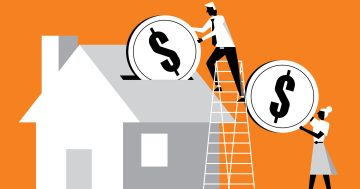Ken Moraif* says stock market losses can be more dangerous to retirement savings than lower investment returns.

Photo: fizkes
Do you want to make your savings last throughout retirement?
If you do (and of course you do), I believe that once you are within five years of retirement, you need to invest more conservatively than you did while you were growing your savings.
But in most cases, a more conservative approach translates into lower returns.
Is it a worthwhile trade-off?
I believe so, and I’d like to illustrate my point with a question: If you lost 50 per cent of your money in a market, how much would you need to make to get back to even?
Did you say 50 per cent?
If so, you’re in good company: When I ask this question during seminars, that’s usually the answer I receive.
It’s also a wrong answer.
Let’s do the math:
How a 50 per cent gain can result in a $250,000 loss
If you had $1 million saved for retirement and lost 50 per cent, you would have $500,000. Ouch.
If you made 50 per cent on that $500,000, you’d make $250,000, which would bring your total up to $750,000, not $1 million.
You’d need to make 100 per cent to get back to even.
And if you did need to make 100 per cent to get back to even, how long would that take you?
At 2 per cent per year, it would take you 35 years to recover.
If you made 6 per cent per year, you would need 12 years to get back to even.
Even if you made 10 per cent per year, it would still take you seven years to recover your money.
And what are the odds you’d make 10 per cent every year for the next seven years?
Sounds like a pretty high expectation to me.
How realistic is a 50 per cent loss?
That’s the cost of losing money, and that’s why I believe losing money is more dangerous to your retirement than lower returns.
Yes, losing 50 per cent of your money may be an extreme example, but people have lost that much, and in recent memory.
The US S&P went down almost 50 per cent in the Y2K bear market, and dropped 57 per cent in 2008.
One more factor to consider: I don’t believe many retirees can afford the time cost involved with waiting.
If you were retired and living on your investments, would you be able to drastically cut your cost of living while you were waiting for your money to come back to even?
What people near retirement should do
The best way to make your savings last is to employ a conservative investment approach once you’re within five years of retirement.
That approach should include:
- Taking only as much risk as is necessary to accomplish your financial goals.
- Employing a strategy that can protect your investments during bear markets.
Yes, those tactics may result in lower returns.
But the cost of lower returns can be worth the cost of protecting your retirement.
* Ken Moraif is CEO and senior adviser at Retirement Planners of America.
This article first appeared at www.kiplinger.com











